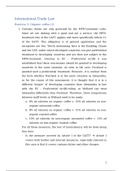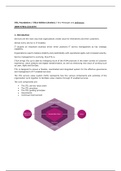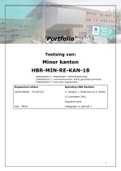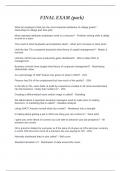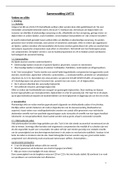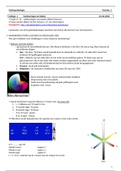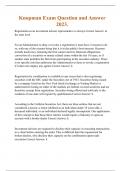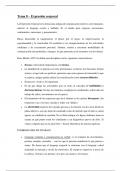International Trade Law
Exercise 3: Organic cofee (I)
1. Customs duties are only governed by the MFN-treatment rules.
Since we are dealing with a good and not a service, the MFN-
treatment rule of the GATT applies and more specifcally Article I:1
of the GATT. This obligation is of general application and the
exceptions are few. Worth mentioning here is the Enabling Clause
and the GSP, under which developed countries can give preferential
treatment to developing countries and are then not subject to the
MFN-treatment, whereas in EC – Preferential tariff it was
established that these concessions should be granted to developing
countries in the same situation. As seen in the case, Poorland is
granted such a preferential treatment. However, it is unclear from
the facts whether Poorland is in the same situation as Alexandria,
so for the course of this assessment, it is thought that it is in a
diferent ‘leaguet of developing countries than Alexandria in line
with the EC – Preferential tariff-ruling, so Welland can treat
Alexandria diferently than Poorland. Therefore, three comparisons
between tarif levels in Welland need to be made:
a. 8% ad valorem on organic cofee v. 10% ad valorem on non-
organic unroasted cofee
b. 8% ad valorem on organic cofee v. 15% ad valorem on non-
organic roasted cofee
c. 10% ad valorem on non-organic unroasted cofee v. 15% ad
valorem on non-organic roasted cofee
For all these measures, the test of inconsistency will be done along
four tiers:
- Is the measure covered by Article I of the GATT? Article I
covers both border and internal measures, especially relevant in
this case is that it covers customs duties and other charges
1
, - Does the measure confer any trade advantage? any advantage
to any country (so can also be a non-WTO member!), and can be
de jure or de facto (i.e. EC – Seal Productf)
- Are the products concerned ‘liket? an analysis of the nature
and extent of the competitive relationship on the relevant market
(including product characteristics, end-use, tarif classifcation,
consumer habits and preferences ethical concerns about
PPMs can only be relevant if they afect buying behaviour),
whereby the intent of the implementing country does not matter
- Whether the advantage is granted immediately and
unconditionally the ‘liket product from another Member
should receive the same treatment without conditions
a. – The ad valorem-rates are customs duties, and as such fall
within the scope of Article I:1 of the GATT;
– The measure de facto gives an advantage to countries
producing organic unroasted cofee beans (in the form of a
2%-lower custom on their products);
– The only diference between organic unroasted cofee beans
and non-organic unroasted cofee beans is that in their
production process, these former is not subject to pesticides
and other chemicals and the latter is. However, if PPMs afect
consumer behaviour on the Wellandian market, this might
result in the consideration of the Panel that the products are
‘liket. However, as seen in the facts of the case, Wellandianst
buying behaviour is not subject to much change when there
are ethical considerations into play. Hence, it is likely that
these products are found to be like;
– A non-organic unroasted cofee bean from State A does not
receive the same treatment as an organic unroasted cofee
bean from State B, and hence the measure does not apply
immediately and unconditionally. It can thus be concluded
that the measure is in violation of Article I:1.
2
Exercise 3: Organic cofee (I)
1. Customs duties are only governed by the MFN-treatment rules.
Since we are dealing with a good and not a service, the MFN-
treatment rule of the GATT applies and more specifcally Article I:1
of the GATT. This obligation is of general application and the
exceptions are few. Worth mentioning here is the Enabling Clause
and the GSP, under which developed countries can give preferential
treatment to developing countries and are then not subject to the
MFN-treatment, whereas in EC – Preferential tariff it was
established that these concessions should be granted to developing
countries in the same situation. As seen in the case, Poorland is
granted such a preferential treatment. However, it is unclear from
the facts whether Poorland is in the same situation as Alexandria,
so for the course of this assessment, it is thought that it is in a
diferent ‘leaguet of developing countries than Alexandria in line
with the EC – Preferential tariff-ruling, so Welland can treat
Alexandria diferently than Poorland. Therefore, three comparisons
between tarif levels in Welland need to be made:
a. 8% ad valorem on organic cofee v. 10% ad valorem on non-
organic unroasted cofee
b. 8% ad valorem on organic cofee v. 15% ad valorem on non-
organic roasted cofee
c. 10% ad valorem on non-organic unroasted cofee v. 15% ad
valorem on non-organic roasted cofee
For all these measures, the test of inconsistency will be done along
four tiers:
- Is the measure covered by Article I of the GATT? Article I
covers both border and internal measures, especially relevant in
this case is that it covers customs duties and other charges
1
, - Does the measure confer any trade advantage? any advantage
to any country (so can also be a non-WTO member!), and can be
de jure or de facto (i.e. EC – Seal Productf)
- Are the products concerned ‘liket? an analysis of the nature
and extent of the competitive relationship on the relevant market
(including product characteristics, end-use, tarif classifcation,
consumer habits and preferences ethical concerns about
PPMs can only be relevant if they afect buying behaviour),
whereby the intent of the implementing country does not matter
- Whether the advantage is granted immediately and
unconditionally the ‘liket product from another Member
should receive the same treatment without conditions
a. – The ad valorem-rates are customs duties, and as such fall
within the scope of Article I:1 of the GATT;
– The measure de facto gives an advantage to countries
producing organic unroasted cofee beans (in the form of a
2%-lower custom on their products);
– The only diference between organic unroasted cofee beans
and non-organic unroasted cofee beans is that in their
production process, these former is not subject to pesticides
and other chemicals and the latter is. However, if PPMs afect
consumer behaviour on the Wellandian market, this might
result in the consideration of the Panel that the products are
‘liket. However, as seen in the facts of the case, Wellandianst
buying behaviour is not subject to much change when there
are ethical considerations into play. Hence, it is likely that
these products are found to be like;
– A non-organic unroasted cofee bean from State A does not
receive the same treatment as an organic unroasted cofee
bean from State B, and hence the measure does not apply
immediately and unconditionally. It can thus be concluded
that the measure is in violation of Article I:1.
2


